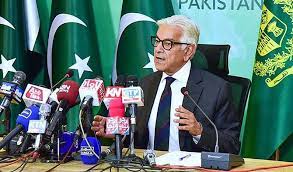ISLAMABAD: As Islamabad exploring ways to meet its energy needs, Defence Minister Khawaja Asif has said that the country is in a position to complete the much-delayed Pakistan-Iran gas pipeline project ahead of President Ibrahim Raisi’s visit this month.
“Pakistan is in a position to complete [gas] pipeline project with Iran, and makes decision regarding it,” Asif said while speaking on Geo News‘ Capital Talk programme, adding: “We are constructing gas pipeline on our side from Gwadar to the Iranian border.”
Earlier this month, The News reported that Pakistan commenced the work to begin the construction of the 80km section of the Pakistan-Iran gas pipeline from Gwadar to a point where it can be connected with the Iranian section of the project.
The development came amid the United States’ explicit opposition to the bilateral project, coupled with warnings of potential sanctions, which has faced a nearly decade-long delay as it was set to be completed in December 2014 followed by its operationalisation in January 2015.
Iranian President Ibrahim Raisi is set to visit Pakistan on April 22, sources told Geo News earlier today, amid prevailing tensions in the Middle East over Iran’s unprecedented drone and missile attack on Israel.
As per the sources, Islamabad and Tehran have agreed upon the matters pertaining to President Raisi’s visit who will be accompanied by a high-level delegation and will hold meetings with Prime Minister Shehbaz Sharif, President Asif Ali Zardari, and the military leadership.
The visit is part of ongoing efforts by the two countries to deepen their cooperation which faced a temporary setback earlier this year.
Pointing towards border tensions between the neighbourly countries in January, the defence minister told Capital Talk host Hamid Mir that ties between Pakistan and Iran are stable despite an incident earlier. “Progress was made on the gas pipeline project which further strengthened bilateral ties.”
Relations between the two countries had turned sour after Pakistan, in retaliation to Tehran’s cross-border strikes, carried out precision strikes using killer drones, rockets, loitering munitions and stand-off weapons to target terrorists inside Iranian territory.


